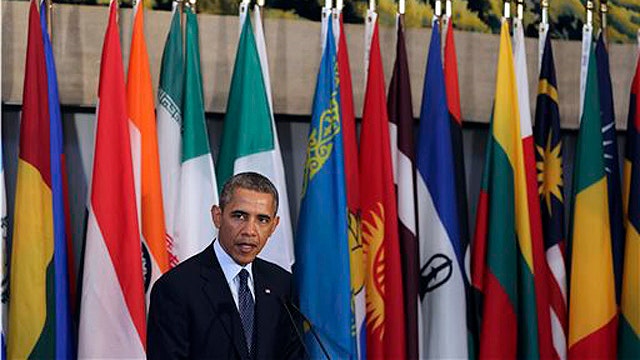President Obama reaches out to new Iranian president
U.N. speech signals shift in approach to Tehran
President Obama's speech to the United Nations General Assembly in New York was flawed, displaying a type of moral equivalency that does not exist for America's enemies.
His claim that "The world is more stable than it was five years ago" is demonstrably false. In Iraq, Afghanistan, Syria, Kenya, Congo, to name only a few, there are at least as many conflicts as in 2008 and far more now than when the United Nations was created.
According to Themner, Lotta and Peter Wallensteen, in "Armed Conflict, 1946-2011," Journal of Peace Research, there were fewer than 20 armed conflicts in 1946. Today there are more than 30.
The president seemed to take at face value a "fatwa," or religious edict, issued by Iran's supreme leader, Ali Khamenei, against the development of nuclear weapons. He said, "President Rouhani has just recently reiterated that the Islamic republic will never develop a nuclear weapon."
[pullquote]
There are reportedly a half-dozen nuclear sites in Iran where uranium is being enriched. They are buried deep in the earth and have concrete walls several feet thick. The Iranians claim they're developing electrical power for peaceful purposes. That's not the profile of any power station with which I am familiar.
Breaking news for the president: Our enemies lie by telling us what we want to hear while behaving duplicitously.
The president barely mentioned the slaughter of 85 Pakistani Christians over the weekend. He didn't mention at all the Muslim war against Coptic Christians in Egypt. Why dwell on unpleasant realities when wishful thinking feels better?
The president again dredged up the conflict between Israel and the Palestinians, repeating the "two-state solution" formula that the Palestinians pay lip service to, while preferring a one-state solution, absent Israel.
President Obama seemed to again blame America for Muslim "hostility" because of U.S. involvement "in the Muslim world." U.S. motivation for such involvement has been two-fold: strike at terrorists and reduce the threat they pose to the U.S. and its interests, and free people from political and religious oppression. One can debate whether those goals were sufficient to prompt U.S. "involvement," but there can be no debate that America's objectives were altruistic and rooted in self-preservation.
As an example of how political and religious differences can be resolved, the president again pointed to Northern Ireland and its many decades of internal conflict.
While the Northern Ireland conflict pitted Protestants against Catholics, the central issue was loyalty to Britain vs. a united Ireland.
Religion helped fuel the fire, but it wasn't the fire itself. Neither side claimed a divine mandate to wipe out the other.
Apparently unbeknownst to the president, the peace process in Ireland embodies something the fight for peace in the Middle East does not -- a willingness by all sides to cooperate. Have we seen any real offers of cooperation from Iran? Afghanistan? Egypt?
The president said America has been humbled by its foreign adventures. Humility and retreat are not a policy, unless we plan to surrender to Islamists. He didn't articulate America's foreign policy, because he doesn't have one.
Islamic fundamentalists can only be encouraged by this speech. They include Iran's president, Hassan Rouhani, who wants to suddenly make nice with President Obama in large part to ease crushing economic sanctions.
The last line of the president's U.N. speech may have been the most fantastical of all: "...we remain convinced that this community of nations can deliver a more peaceful, prosperous and just world to the next generation."
There is no "community of nations." There are individual nations with individual interests. If the United Nations could bring peace and prosperity to the world, progress toward that goal should have been made by now. Instead, 68 years after its founding, wars and rumors of wars are increasing.





















